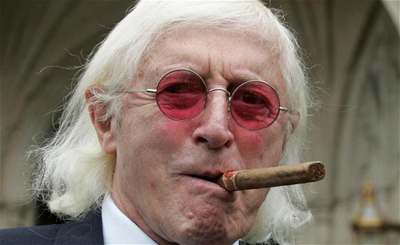
The revelations about Jimmy Savile expose wider institutional and social problems, explains Lindsey German
Jimmy Savile: who would have believed it? Well, quite a few people as it turns out. The police were contacted about allegations eight times, including an allegation of abuse which took place in a caravan at BBC Television Centre in Shepherds Bush. Savile’s name came up in the investigation of sex abuse at the Haut la Garenne children’s home in Jersey, which he visited. There were repeated rumours that the grotesque BBC presenter and DJ had a proclivity for sexual relations with girls.
Yet Savile became a friend of royalty and of Prime Minister Margaret Thatcher. He was a regular guest at Chequers over Christmas. He was one of the BBC’s most cherished ‘personalities’, allowed freedom to spout his banalities on a range of programmes.
Savile was warmly and excessively rewarded for his meagre talents. Briefly a coal miner then a wrestler in his youth, he was heaped with honours and privileges.
Friend of the establishment
Who exactly thought it was a good idea to give him a knighthood for his charity work? Was there no vetting when it was proposed by government, without any of the rumours or dropped investigations giving anyone a moment’s hesitation?
Whose idea was it exactly that Savile should be allowed the keys to the wards to Broadmoor maximum security hospital, free to wander among people he had no right to be with and no qualification to care for?
Who authorised him having rooms there, and at Stoke Mandeville and Leeds hospitals? He apparently used his lodgings there as a base for further abuse. Some of those responsible for caring for physically or mentally ill patients had suspicions of this abuse; some made complaints. It is still quite incredible that senior figures in these institutions allowed Savile such freedom.
Did no one at any stage say that raising money for charity or being somebody famous on TV did not qualify him to do what he wanted – which we now know included abusing some of the most vulnerable sexually?
No one seems to have any answers now – not the BBC who showcased him, the politicians who knighted him, the police who failed to pin any charges on him. Savile seems to have got away with terrible crimes and abuse. Like the Russian monk Rasputin, his behaviour was permitted by the powerful.
Sexual abuse and society
What does the Savile case say about British society? It is, first and foremost, a recognition that sexual abuse exists on a very wide scale, and that it is not always acknowledged or dealt with.
In the past few decades our awareness of sexual abuse in the family has become greater, and most sexual abuse takes place in and around the family and those known to the victims.
But the Savile case highlights the levels of abuse which take place among those who are vulnerable in society and to whom the state owes a duty of care. The children in Haut la Garenne, or in the Staines approved school which Savile visited frequently in the 1970s, were already vulnerable and in the care of the state. They were terribly let down by precisely the institutions that were supposed to care for them. The recent case of abuse of young girls in council care in Rochdale highlights the lack of care which so many young people still suffer. Why are they ignored and left in these terribly vulnerable places? One reason is that they are poor, often without families to stand up for them. Their care is paid for on a shoestring, they are written off as difficult social cases, and society refuses to put the resources into helping to repair the damage done to them. They therefore become prey to people like Savile.
Celebrity culture
Yet there is more to this case. Savile was able to do what he did because he was rich and powerful, a celebrity who made lots of money for charity and lots of money for the BBC. He therefore became untouchable, even more so as hospitals and other public services depended more on charity as public spending was cut.
Reliance on charity means reliance on the whim of the rich and powerful, whose commitment to these causes usually costs them little because of tax relief but who see their egos massaged and their status grow. The celebrity culture also promotes the idea of a small number of famous or talented people being the arbiters of all cultural norms in society. The media (including the BBC) bow down to a celebrity culture, which hangs on the every word of its most famous figures without questioning too much about their fitness to pronounce on various subjects, let alone investigating what they do too closely.
The astonishing decision by the BBC to continue with family Christmas tributes to the man after they knew Savile was being investigated over the sex abuse allegations tells us how in thrall it is to celebrity culture. While it hurries to deny that anything similar could happen today – and let us hope that is true – BBC attitudes to offensive behaviour by its celebrities have been notoriously laissez faire. If someone like Jeremy Clarkson makes money for the BBC then misogyny and xenophobia are OK.
It is to be hoped that the victims in the Savile case receive some justice, even though he can no longer be brought to trial. But what is really required is a much more fundamental change in society.
Sexual abuse is about unequal power relationships: between men and women, rich and poor, young and old. To begin to end it means listening to the most vulnerable rather than penalising or criminalising them. It also means challenging an establishment which protects its own.

